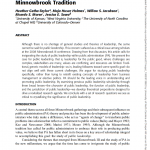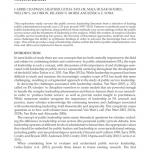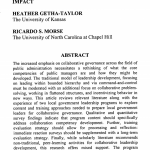Author: Heather Getha-Taylor

Focusing the Public Leadership Lens: Research Propositions and Questions in the Minnowbrook Tradition
Although there is no shortage of general studies and theories of leadership, the same cannot be said for public leadership. This concern surfaced as a critical issue among scholars at the 2008 Minnowbrook III conference. Drawing from that discussion, this article calls for invigorating the study of public leadership within public administration (PA). We present the case for public leadership, that is, leadership for the public good, where challenges are complex, stakeholders are many, values are conflicting, and resources are limited. Traditional, generic models of leadership—as in, leading followers toward some specific goal—do not align well with these current challenges. We argue for studying public leadership specifically, rather than trying to retrofit existing concepts of leadership from business management or elective politics. PA should be the leading voice in understanding and promoting public leadership. By examining previous public leadership scholarship through three broad lenses—the character of public leadership, the function of public leadership, and the jurisdiction of public leadership—we develop theoretical propositions designed to drive a revitalized research agenda. We conclude with a set of research questions we see as critical to crystallizing the significance of public leadership.
Cite as:
Heather Getha-Taylor, Maja Husar Holmes, Willow S. Jacobson, Ricardo S. Morse, Jessica E. Sowa, Focusing the Public Leadership Lens: Research Propositions and Questions in the Minnowbrook Tradition, Journal of Public Administration Research and Theory, Volume 21, Issue suppl_1, January 2011, Pages i83–i97, https://doi.org/10.1093/jopart/muq069
…
Continued
How Public Service Leadership is Studied: An Examination of a Quarter Century of Scholarship
This exploratory study surveys the public service leadership literature from a selection of leading public administration journals over a 25‐year period (1987–2012). Patterns in methods used to study public leadership are explored, along with how those methods vary across settings within the public service sector and the treatment of leadership in the analysis. While the number of empirical studies of public service leadership has grown, the diversity of theoretical approaches, methods and measures challenges the ability to synthesize findings in order to advance the knowledge base on this topic. This article provides a map of leadership studies within the field of public administration over time and offers prescriptions for future research.
Cite as:
CHAPMAN, C., GETHA-TAYLOR, H., HOLMES, M., JACOBSON, W., MORSE, R. and SOWA, J. (2015). HOW PUBLIC SERVICE LEADERSHIP IS STUDIED: AN EXAMINATION OF A QUARTER CENTURY OF SCHOLARSHIP. Public Administration, 94(1), pp.111-128.
…
Continued
Collaborative Leadership Development for Local Government Officials
The increased emphasis on collaborative governance across the field of public administration necessitates a rethinking of what the core competencies of public managers are and how they might be developed. The traditional model of leadership development, focusing on leading within bounded hierarchy and via command-and-control must be moderated with an additional focus on collaborative problem solving, working in flattened structures, and incentivizing behavior in new ways. This article reviews relevant literature along with the experience of two local government leadership programs to explore content and training approaches needed to prepare local government leaders for collaborative governance. Qualitative and quantitative survey findings indicate that program content should specifically address collaboration competency development. Further, training evaluation strategy should allow for processing and reflection: immediate reaction surveys should be supplemented with a long-term evaluation strategy. Finally, while scholarly literature recommends non-traditional, peer-learning activities for collaborative leadership development, this research offers mixed support. The program examples and associated research findings highlight the importance of a strategic approach to training that reflects emerging leadership needs.
Cite as:
GETHA-TAYLOR, H., & MORSE, R. (2013). COLLABORATIVE LEADERSHIP DEVELOPMENT FOR LOCAL GOVERNMENT OFFICIALS: EXPLORING COMPETENCIES AND PROGRAM IMPACT. Public Administration Quarterly,37(1), 71-102. Retrieved from http://www.jstor.org/stable/24371989
…
Continued
